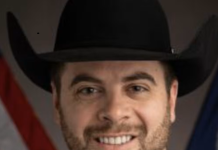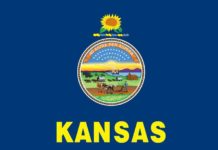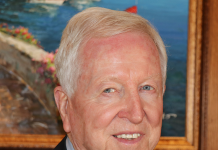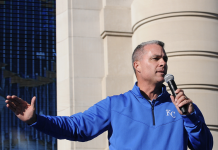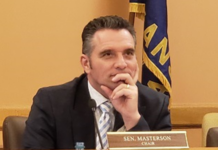State prosecutors on Wednesday charged the mayor of the small town of Coldwater with election fraud, alleging that he voted illegally as a citizen of Mexico.
Attorney General Kris Kobach announced that Jose Ceballos – a legal permanent resident of the United States who is a citizen of Mexico – was charged with three counts of voting without being qualified and three counts of election perjury.
The charges were filed in Comanche County. The charges are nonperson felonies. Ceballos could face up to 68 months in prison and up to $200,000 in fines.
Appearing at a news conference Wednesday with Secretary of State Scott Schwab, the attorney general used the opportunity to raise the prospect of noncitizens voting in Kansas, a basis for a law struck down in court that required proof of citizenship to register to vote.
In that 2018 case, a federal judge expressed deep skepticism about claims of rampant voter fraud stemming from noncitizens registering to vote.
Kobach said it’s still an issue confronting the state.
“Noncitizen voting is a real problem,” Kobach said. “It’s not something that happens once in a decade. It is something that happens fairly frequently. It’s a very real issue.”
Ceballos was reelected Tuesday with about 83% of the vote, according to unofficial results.
The three-day grace period for mail ballots to arrive at the election office does not end until Friday, so the election is not official.
It will be up to the city’s governing body to decide whether to seat him, but the secretary of state says the law prohibits him from taking office because he’s not a qualified elector.
The charges are based on Ceballos voting in the 2022 general election, the 2023 general election for local offices and the 2024 primary election.
State law requires a city officeholder to be a qualified elector and someone has to be a U.S. citizen to be a qualified elector, the attorney general said.
Ceballos has been mayor of Coldwater – population about 660 – since 2021 and served on the City Council for two four-year terms previously.
State election officials said he has been registered to vote since at least 2006, the last year for which the state has voting records on file.
Kobach said the criminal complaint only refers to the three elections from 2022 to 2024 and declined to discuss whether Ceballos violated the law previously.
Efforts to reach Ceballos at a city email account and by phone at a number listed as a contact were unsuccessful Wednesday afternoon.
But the Coldwater City Council issued a statement posted on the city’s Facebook page.
The council said it was called to a special meeting by the mayor Wednesday to discuss the legal case brought by the attorney general.
“At this time, our focus remains on ensuring that city operations continue to run smoothly and that the needs of our community are met,” said the message signed by City Council President Britt Lenertz.
“It’s important that we respect both due process and the integrity of our local government,” Linertz wrote.
Schwab said Wednesday that the state now has tools to verify whether voters are legitimately on the election rolls.
Schwab has agreed to share state voter roll information with federal immigration authorities to screen the state’s voter rolls for anyone living in the United States illegally or who might be dead.
He also added that someone could be on the rolls who is living in the country legally but is not a citizen and is not eligible to vote.
Last August, Schwab’s office signed a memorandum of understanding with the U.S. Citizenship and Immigration Services to run information for about 2 million Kansas voters through a federal database to match citizenship and immigration status as well as whether there’s anyone on the rolls who died.
The secretary of state’s office provided voter information that included dates of birth and the last four digits of Social Security numbers.
The data is run through the SAVE program, short for Systematic Alien Verification for Entitlements.
The SAVE program verifies U.S. citizenship, naturalized or derived U.S. citizenship, or immigration status by searching available federal databases, including those from the Department of Homeland Security, Customs and Border Protection, the Department of State and the Social Security Administration.
Since Jan. 20, more than 42 million voters have been checked through SAVE to validate their citizenship and immigration status, the agency said.
And to date, 26 states have completed a SAVE Voter Verification Memorandum of Agreement with the federal government.
Schwab and Kobach would not say whether authorities learned about Ceballos through the SAVE database.
But Schwab said when the state started using the SAVE program, he thought it might produce three or four positives, but it’s now turning up hundreds that have to be analyzed to determine for sure whether they should not be on the voter rolls.
“This is not witch hunt. This is just us doing what the Legislature told us to do,” Schwab said. “If you broke the law knowingly and willingly, we’re going to hand it over to the attorney general.”
He added, “Attorney general, be prepared to be busy as we go through these and find out potential positives of people who are not U.S. citizens who have voted.”


